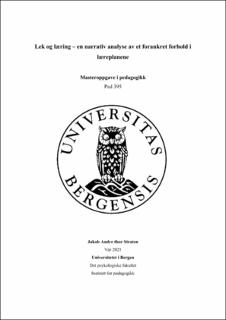| dc.contributor.author | Straten, Jakob Andre Thor | |
| dc.date.accessioned | 2021-06-24T00:09:32Z | |
| dc.date.available | 2021-06-24T00:09:32Z | |
| dc.date.issued | 2021-05-28 | |
| dc.date.submitted | 2021-06-23T22:00:47Z | |
| dc.identifier.uri | https://hdl.handle.net/11250/2760955 | |
| dc.description.abstract | Dette forskningsprosjektet undersøker hvordan forholdet mellom lek og læring er fremstilt i de tre siste læreplanverkene: L97, LK06 og LK20. Tidligere forskning og evaluering viser til et paradigmeskifte mellom perioden ved implementeringen av Læreplanreform 97 hvor leken gjorde sin inntreden i skolens pedagogikk og implementeringen av Kunnskapsløftet 06. Med Kunnskapsløftet 06 ble den tradisjonelle nordiske skoletradisjonen endret til et skolesamfunn der kunnskap og konkurranse stod sentralt. Implementeringen av den nye læreplanen, Kunnskapsløftet 20 gjør det mulig å undersøke om det er nye bevegelser i forholdet mellom lek og læring. Oppgavens problemstilling er satt til å belyse bevegelsene i fremstillingen av relasjonen mellom begrepene lek og læring. For å belyse dette er det arbeidet ut fra følgende problemstilling: «Hvordan fremstilles forholdet mellom lek og læring i Læreplanreform 97, Kunnskapsløftet 06 og Kunnskapsløftet 20 i den overordnede delen og fagene norsk og matematikk opp til 4. klassetrinn?». Inkluderingen av disse tre læreplanene, fra implementeringen av lek i læreplan og frem til dagens aktuelle læreplan gjør det mulig å utskrive en helhetlig fortelling på tvers av læreplanene, noe som gir et helhetlig bilde av bevegelsesmønstrene. Begrensningene som er gjort, er i tråd med hvilke fag paradigmeskiftet har påvirket i størst grad og også blant fagene som regnes som kjernefag i grunnskolen. Analysene er gjennomført ved en narrativ-metodisk tilnærming inspirert av Emery Roe og hans fokus på policy narratives, eller politiske fortellinger. Her ses læreplanverkene som bærere av politiske fortellinger som setter rammer for vår forståelse av sammenhengen mellom lek og læring. I analysen er det identifisert både en overordnet fortelling som er gjennomgående i de tre læreplanverkene, og videre er det identifisert underliggende fortellinger om lek og læring. Resultatene viser til en dominerende fremstilling hvor lek relateres til læring som et virkemiddel eller verktøy. Dette skaper et kausalt plot hvor lek fører til læring i samtlige av de aktuelle læreplanene. Det er også gjort funn som viser til nedgang i vektlegging av lek som virkemiddel i skolen da paradigmeskiftet med LK06 fant sted, men også en mulig endring ved den nye læreplanen som implementeres i disse dager. | |
| dc.description.abstract | This thesis explores the relationship between play and learning in the three latest National Curricula: Læreplanreform 97, Kunnskapsløftet 06 and Kunnskapsløftet 20. Previous research and evaluations refer to a paradigm shift between the implementation of Læreplanreform 97, where play was introduced into school pedagogy, and the implementation of Kunnskapsløftet 06. Through Kunnskapsløftet 06, the traditional Nordic school tradition was transformed into a school society where knowledge and competition became central. The implementation of the new National Curriculum, Kunnskapsløftet 20, makes it possible to examine if there are new changes / alterations in the relationship between play and learning. The research-question of this thesis is set to explore the changes in the presentation of the relationship between the concepts of play and learning. The research question is: “How does the relationship between play and learning in Læreplanreform 97, Kunnskapsløftet 06 and Kunnskapsløftet 20 manifest itself in the Core Curriculum and the subjects Norwegian and Mathematics up to 4th grade?”. The inclusion of these three curricula, makes it possible to write a holistic narrative across the curricula, providing a holistic picture of the changes. The limitations taken are in line with the subjects most affected and are also among the subjects which are considered the main subjects in primary and lower secondary schools. The analysis is carried out using a narrative-methodological approach inspired by Emery Roe and his focus on policy narratives, or political narratives. Here, the curricula are perceived as carriers of policy stories which set the framework for our understanding of the connection between play and learning. In the analysis, an overall story which is consistent throughout the three curricula, has been identified, and further underlying narratives about play and learning have been identified. The results refer to a dominant presentation where play is related to learning as a device. This creates a causal plot where play leads to learning in all the relevant curricula. Findings also show a decline in using play as a device in schools when Kunnskapsløftet 06 was put into practice, though also a potential change with the implementation of the new National Curriculum. | |
| dc.language.iso | nob | |
| dc.publisher | The University of Bergen | |
| dc.rights | Copyright the Author. All rights reserved | |
| dc.subject | Policy analysis | |
| dc.subject | Kunnskapsløfte | |
| dc.subject | play | |
| dc.subject | Kunnskapsløftet 20 | |
| dc.subject | Lek | |
| dc.subject | playbased learning | |
| dc.subject | læring | |
| dc.subject | Pedagogikk | |
| dc.subject | Læreplan | |
| dc.subject | learning | |
| dc.subject | narrativ analyse | |
| dc.subject | narrative analysis | |
| dc.title | Lek og læring - en narrativ analyse av et forankret forhold i læreplanene | |
| dc.title.alternative | Play and learning - a narrative analysis of a persistent relationship in the curriculum | |
| dc.type | Master thesis | |
| dc.date.updated | 2021-06-23T22:00:47Z | |
| dc.rights.holder | Copyright the Author. All rights reserved | |
| dc.description.degree | Masteroppgave i pedagogikk | |
| dc.description.localcode | PED395 | |
| dc.description.localcode | MAPS-PED | |
| dc.subject.nus | 724112 | |
| fs.subjectcode | PED395 | |
| fs.unitcode | 17-42-0 | |
